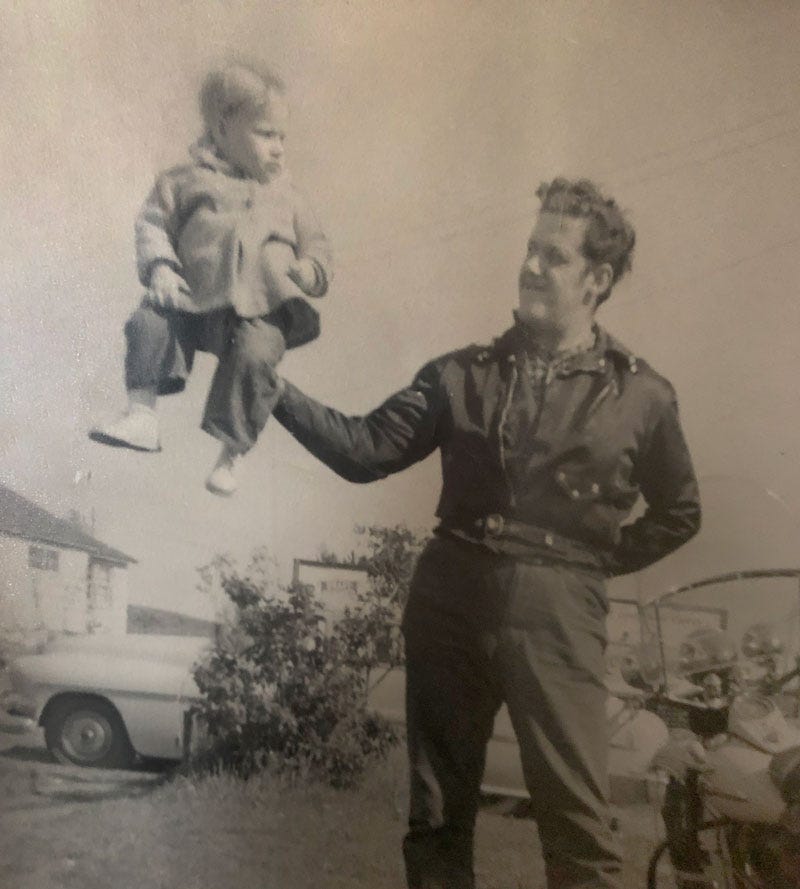My sister had braces. I didn't.
It's not that my parents didn't offer them to me, but my self-esteem was already so whisper-thin and fragile that I figured shoving a bunch of springs and wires into my apparently already un-kissable mouth would only make things worse. (This was in the 1990s, before the invention of invisible aligners.) Being a dumbass teenager, I never really considered the longer-term implications for my adult self-esteem of having teeth that looked like if Stonehenge got drunk.
I've never smiled with my teeth showing if I could help it. For photos, anyway—if I walked around keeping my lips stretched stiffly across my teeth whenever I laughed I'd look like an extra from Planet of the Apes who forgot his mask and was trying to blend in. So anyway, at age thirty-six, I finally signed up for one of those at-home aligner plans that wrench all your mouth bones into the right places. I'm not going to name which company because I'm only halfway through the program and I don't want to give free advertising to something that might end up not working, but so far progress is promising. Soon I’ll hopefully have corrected one of the many things I fucked up when I was younger—these little time bombs I've left for myself over the years.
Sometimes I feel like all the open spaces in my body are just pores of varying sizes for soaking up increasing amounts of regret. Why didn't I keep making short films? Why didn't I stick with improv? Why did I give up so easily on finding an agent for my first novel? Why haven't I gone to an open mic night yet? Why did I squander so much of my youth?
My grandpa turned ninety back in April. Something he likes to say to try to give people perspective about grievances or disappointments is, “in a hundred years, who’ll give a shit?” It means a lot coming from someone nearly old enough to have century-old regrets. I think about that a lot because it’s really easy to get caught up in things happening right now that ultimately won’t matter in the near future, often even within a few hours.

Here’s a photo of him holding my aunt with one hand.
That’s not to say that things don’t have repercussions stretching far into the future. A lot of stuff happened in 1919 that really messed things up in 1933 and we still care about it today 100 years later. Everything’s connected through these causal threads that tug on each other over time in this terrible tapestry of existence, and even positive things and small things can have fucked-up Butterfly Effect repercussions a dozen years down the line. But a lot of the things that bother us don’t really matter in the long run. Anyway, even though a hundred years from now nobody’s going to care whether my mouth looks like an archeological dig of an ancient pottery store, I’m glad I’m fixing it.
I’ll be sure to keep you updated on developments with my teeth.
Anyone who claims to enjoy politics does not actually understand politics.
Nobody should like politics, especially not in this country, but there’s a certain kind of person who’s “into politics” in a way that makes it clear that they’re interested in it for the wrong reasons. For them it’s about the celebrity of politicians and all the bullshit pageantry and galas and fundraisers. It’s all very ego-driven rather than policy-driven, which is why they’ll get mad at you if you criticize the records or policy philosophies of their favorite politicians. The ‘ego-politics’ liberals are the ones who don’t want to abolish the Senate because some of their favorite politicians are Senators, even though the Senate gives a significant inherent advantage to conservatives.
Here’s a fun math fact: Wyoming (pop. 568,125) has thirty-four times as much Senatorial power as New York (pop. ~19,880,000). You read that right: 34. Liberals have been mad about the Electoral College since Al Gore lost the Presidency despite winning the popular vote in 2000, yet our entire government has a conservative skew:
The Electoral College means that a candidate can lose the popular vote but win the Presidency. (This has only ever benefited Republicans, and in fact the last two Republican Presidents have lost the popular vote and only won through this technicality.)
The Senate gives rural states, which tend to be more conservative, more power than urban states, which tend to be more liberal. It also prioritizes Amount Of Owned Land over Number Of People. Theoretically if one of our nation’s multibillionaires decided to use some of their wealth to buy all the houses in a less-populous state, we could have two Senators representing one resident. (The average value of a home in Wyoming is $226,000 so you could buy the entire state out for $128,424,800,000—$31,675,200,000 less than Jeff Bezos’s net worth.)
Unmitigated gerrymandering has allowed Republicans in the House to create contortionist districts over which they can maintain perpetual chokeholds. (Gerrymandering has only ever benefited Republicans.)
Age minimums ensure that younger people, who tend to be more leftward-leaning, are disenfranchised from holding office. (You can’t run for Senate, for instance, until twelve entire years after you’re able to vote, and up to sixteen years after you’re required to pay taxes.)
Lack of term limits in Congress and the Supreme Court ensure that older generations, who tend to skew more conservative, can leverage incumbency to hold power indefinitely. (Especially a problem in the Supreme Court, where members are appointed rather than elected, with some of our more recent members installed by conservative Presidents who’ve lacked a popular mandate.)
That’s not to say that other more balanced forms of government don’t have their problems—UK’s Parliament has done a lot of stupid shit as well, for instance. But here we’ve created such an uphill battle for progressivism that even when the population collectively mandates progressive leadership or decisions, the end result is still conservative. Progress requires not only consensus but practically unanimity, which means it rarely happens.
And it doesn’t help that Democrats endlessly hanker after bipartisanship and compromise—something Republicans don’t care about even a little bit. (There’s a really great video that illustrates the problem with the way Democrats have allowed Republicans to drive the conversation. It’s very much worth watching, along with all this guy’s other content.) Many Democrats seek to appeal to some mythical “center”, which they understandably get a lot of flak for, but it’s hard to blame them when our entire government amplifies the power of conservatism. Or, rather, amplifies the power of the Republican ego identity.
In mid-April I traveled home to the Upper Peninsula of Michigan for my niece’s second birthday, and at the party got to talking to one of my stepdad’s relatives. She lamented low wages and discussed how crappy pay doesn’t help anyone and doesn’t draw people to work in the area. I agreed and said it’s weird that everyone claims low-paying jobs “aren’t worth much,” considering the work done by people in those jobs makes fortunes for the owners and investors of those companies. I told her, “I strongly believe that workers are entitled to most if not all of the wealth their hard work creates,” and she agreed strongly. “Some companies,” I said, “are actually collectively owned by their employees, who split the profits.” “That’s the ideal!” she replied with conviction.
I later learned that she’s a staunch Republican and a huge Trump fan, which was confusing considering her beliefs over the course of that conversation actually seemed to align with communist principles. Capitalists have done such a disturbingly effective job with their propaganda over the years that communists don’t even realize they’re communists, and even despise the system that best aligns with their ideals and convictions.
In the words of Yakov Smirnoff, “waht a cahntry!”

Stuff I’m Enjoying (No Promo)
Episodic Table - My friend Tom has been doing a phenomenal weekly podcast wherein each episode details the history of a different element in the Periodic Table. If you’re familiar with the show Connections, it’s like that but for chemistry. The whole thing is extremely compelling, and the fact that he produces the entire thing by himself is incredible because it’s like something you’d hear on NPR. It’s been gaining traction fast these days so get in on the ground floor—you don’t want to be left behind by all your friends talking about the latest episode on Slack or whatever in six months.
FieriFiction - My friend Shah set up some Machine Learning software to train itself on scripts and subtitles from various TV shows and movies and spit out little stories on Tumblr. The results are surreal and often hilarious, and surprisingly coherent.
I’m also going to include books I’ve recently finished here, in part to encourage myself to read more often since it’ll be embarrassing if I don’t have anything to put here.
Station Eleven, by Emily St. John Mandel - After an aggressive disease wipes out 99% of the human population, the survivors struggle to keep the art and soul of the old world alive, some of them unknowingly sharing a common link from before civilization’s collapse. It’s a terrifying but hopeful approach to apocalypse.
Thanks!
I started this newsletter largely because I enjoyed other people’s newsletters so much—namely:
Luke O’Neil’s “Welcome to Hell World” - Biting and sometimes heartbreaking analysis of some of today’s most (de)pressing issues, often featuring commentary on recent news stories. Despite the somewhat hopeless-sounding title, Luke has a unique optimism and sympathy that helps you feel like you’re not alone in this place.
Mara Wilson’s “Shan’t We Tell The Vicar?” - Fantastic humor and relatable personal anecdotes that often provide insightful social and cultural commentary. The title is inspired by a Twitter thread about fake British TV show names, and posts will often contain new ones.
It’s also been far too long since I’ve had a comfortable outlet for all my long-form thoughts. I used to have one—a website called Enter the Jabberwock that I started way back in 2002. Unfortunately the DNS company I was using fucked up both their website and their customer service so badly a few years ago that I couldn’t renew it, so now it’s forever lost to some domain-squatter piece of shit. (I’ll have more on the scourge of rent-seeking behavior in another edition of this thing, so stay tuned!)
This is the first installment and I’m not sure what its Final Form will be. If you’re on the fence, please bear with me. We all know pilot episodes tend to be a bit shaky. If anything stood out for you either positively or negatively I’d love to hear your feedback. If you liked it enough, be sure to subscribe if you haven’t, and please tell your friends to subscribe as well. And while you’re at it, go subscribe to Luke’s and Mara’s newsletters too because they’re brilliant.
Thanks for reading! Until next time.

Bonus photo of my grandparents (center) in their motorcycle gang back in the 1960s.
